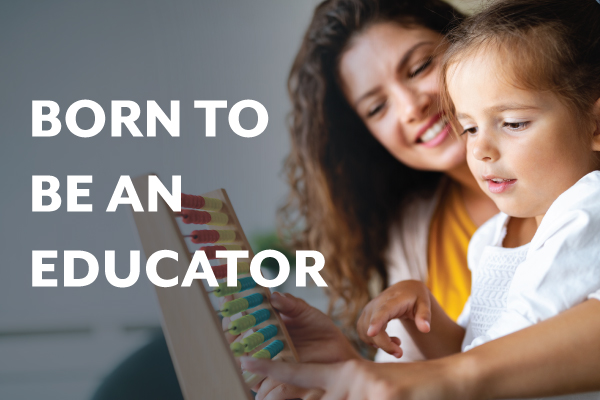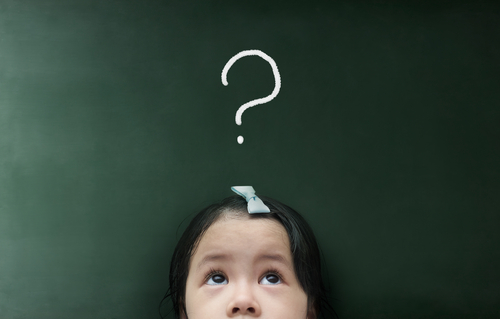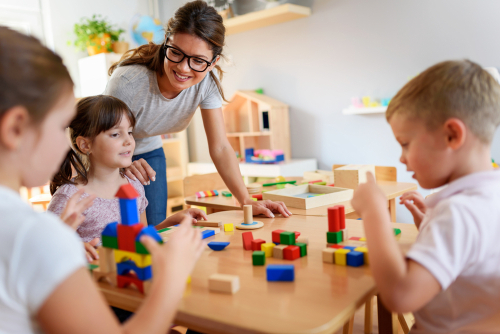*Original source: Early Childhood Australia’s Every Child magazine, article titled “Understanding imitation and educator wellbeing”, author Alana Evans (Vol. 26, #3).
From as young as babies, human beings love to imitate. Copying clapping, waving, facial expressions and the sounds we make are just the beginning. Children imitate what they see throughout their development, which makes the role modelling by early childhood educators of the utmost importance.
To be the best role models for children, educators have a responsibility to ensure they are capable of showing children positive ways to navigate the world and interact with others. The relationship between imitation and educator wellbeing highlights the need for a focus on wellbeing practices and a solid working knowledge of just how much children absorb of what they see and hear.

Understanding imitation in early childhood
Imitation is one of the key ways in which children learn in the first few years of life. Tone of voice, facial expressions, body language and other physical gestures are likely to be mimicked. So too are the features of the way people interact with other people. For example, role-modelling cooperative behaviour can teach children how to better interact with others.
Sometimes called observational learning, imitation is a form of social learning that also helps to teach boundaries, consequences and what is right or wrong. Role-modelling can have an impact on a child’s emotional development, their motor skills, their socialisation, their problem solving and even their willingness to try something new.
The relationship between educator wellbeing and children’s care
Early childhood educators spend most of their time looking after the wellbeing of the children in their care. The importance of educator wellbeing needs to emphasised too — we want educators to experience the effects of enhanced wellbeing so they feel good and get the most from life. Furthermore, research into the mental health and wellbeing of early childhood educators has shown that childcare providers’ mental health is important for their wellbeing and its potential impact on turnover and care quality”.
While concerning, this is to be expected when we consider the central role imitation has on children’s development. Plus, if an educator has a physical illness, we understand they will not be capable of performing to the best of their ability. Wellbeing and mental health are similar: if an educator’s wellbeing is not being taken care of, they won’t be able to be the best educator they can be.
To provide children with the best possible outcomes for their wellbeing, education and development, we need to ensure the health and wellbeing of educators are taken care of.
Tone of voice, facial expressions, body language and physical gestures can all be affected by quality of wellbeing, and in turn can impact children’s wellbeing. Not only can children come to imitate what they are seeing, but they can react or act out in response too.
Children are attuned to the energy that adults and educators communicate so we need to take the time to ensure we engage with children in a more enthusiastic and energised manner.
If an educator is enduring poor mental wellbeing, this can have an impact on their tone of voice, facial expressions and the way they are engaging with those around them. With children in their care to imitate what they are seeing, it’s easy to see how the quality of an educator’s wellbeing can impact children’s own behavioural traits, moods and more.
A focus on wellbeing practices in early childhood
With a focus on wellbeing practices, we can support educators in enhancing their wellbeing to be the best role models possible. Incorporating wellbeing practices in early childhood has benefits for both educators and children.
At Selmar, we begin support and education for early childhood educators around improving their own wellbeing during their course. For example, our practical placement journals encourage educators to develop an awareness of their feelings. Journaling can be a useful wellbeing tool ongoing.
We also focus on development of interpersonal, soft skills that are crucial for life. Communication, emotional intelligence and problem-solving are just a handful of soft skills that can help educators to reach their potential professionally as role models for children, and personally.
Wellbeing practices you can incorporate into childcare services can have a positive impact on the mental health and wellbeing of children and educators. These practices might include:
Mindfulness and meditation
Mindfulness is the practice of paying attention to your body, mind and feelings in the present moment. The practice of mindfulness can benefit children and adults of every age, enabling us to accept and acknowledge the present moment as we experience it. Harnessing the power of mindfulness and meditation you can achieve reduced anxiety and stress while improving focus, self-awareness, calm and happiness.
Time outdoors
Spending time outdoors has been shown to restore mental fatigue, reduce stress, improve mood and boost self-esteem. Make time for educators and children to get outside every day.
Encourage physical activity
Being active has remarkable physical and mental benefits. Moving more improves sleep and focus, reduces anxiety and depression and makes you feel happier. Create opportunities for movement every day. It might be yoga with educators and children, ball games or even just a simple walk.
Improved wellbeing equals better outcomes for all
Wellbeing deserves a renewed focus, especially in light of the impact of the Covid-19 pandemic. Educators and children alike felt the upheaval of the various challenges that the pandemic presented, and wellbeing and self-care practices continue to be vital as time goes on.
Make the effort to support and enhance educator wellbeing and have a positive impact on children’s wellbeing and development and the outcomes achieved at your centre.



